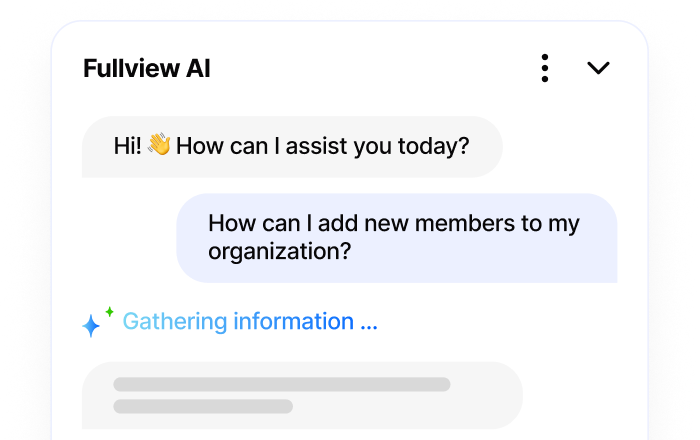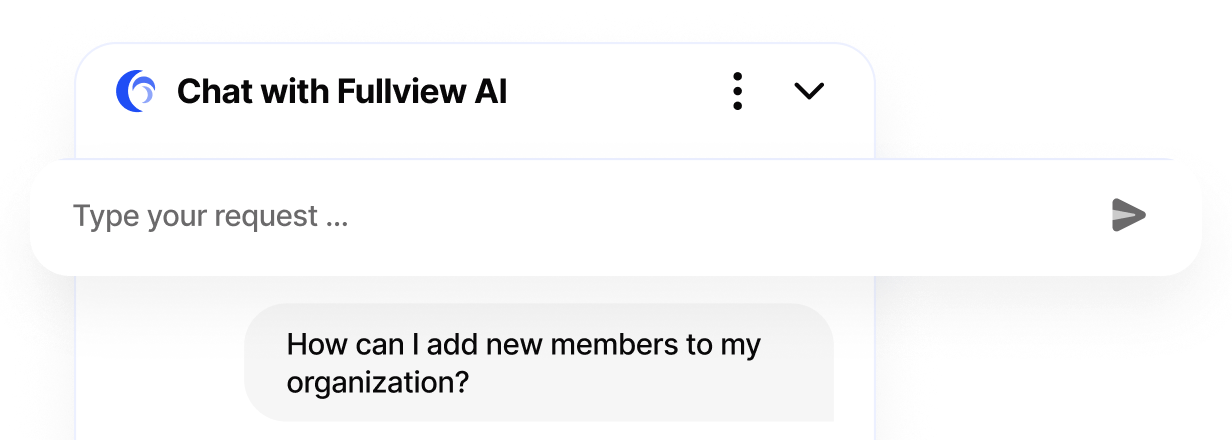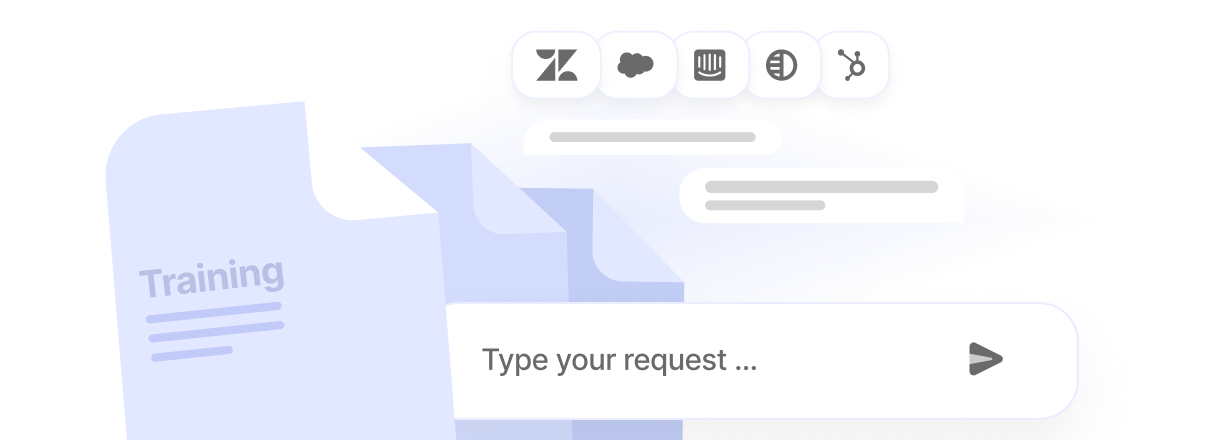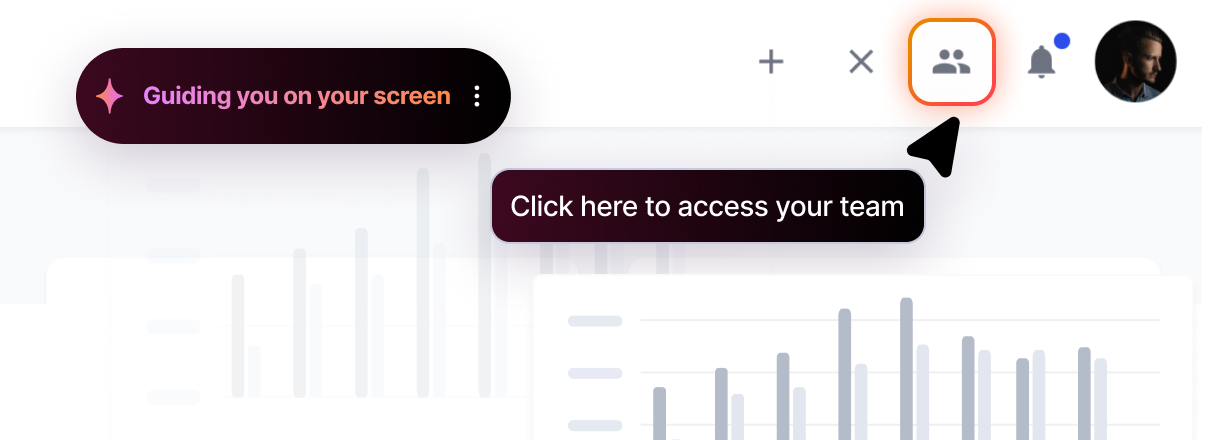Support teams rely on helpdesk platforms to manage tickets, workflows, and team operations. Zendesk, Intercom, Salesforce, HubSpot, and Pylon provide the infrastructure for organizing customer inquiries and routing them to the right agents. These systems include AI features for automation and efficiency.
Many teams also use specialized AI agent platforms to handle customer-facing support interactions. These platforms focus on building intelligent agents that can resolve inquiries autonomously, understand product context, and escalate smoothly when needed.
This guide covers the leading helpdesk platforms and how AI agent platforms like Fullview work alongside them.
AI Helpdesk Software Comparison
Zendesk: AI Helpdesk for Large Support Teams
Zendesk is a comprehensive helpdesk platform built for teams managing high ticket volumes. The system centralizes customer inquiries from email, chat, phone, and social channels into a unified workspace.
Key features:
- Multi-channel ticketing system with automated routing
- Customizable workflows and SLA management
- Built-in knowledge base and help center
- AI-powered ticket categorization and agent suggestions
- Extensive app marketplace with 1,200+ integrations
- Advanced reporting and analytics dashboards
Pricing: Starts at $19 per agent per month for basic plans. Enterprise plans with advanced AI features start around $115 per agent per month.
Best for: Established support teams with complex workflows, multiple departments, and high ticket volumes requiring robust reporting.
Integration with Fullview: Teams using Zendesk add Fullview to build conversational AI agents that handle product guidance autonomously. The no-code agent builder connects to your existing documentation, and visual guidance capabilities show users exactly what to do in your application. Tickets still flow through Zendesk when human support is needed.
Intercom: AI Helpdesk with Unified Messaging
Intercom combines helpdesk ticketing with customer messaging across web, mobile, and email. The platform focuses on contextual communication tied to user behavior and product usage.
Key features:
- Unified inbox for all customer communications
- Ticketing system with assignment rules and workflows
- Product tours and in-app messaging
- AI features for ticket routing and response suggestions
- Customer data platform with user segmentation
- Outbound messaging campaigns
Pricing: Starts at $39 per seat per month. AI features available on higher-tier plans starting at $99 per seat per month.
Best for: SaaS companies that want messaging and support in one platform, especially those already using Intercom for marketing.
Integration with Fullview: Fullview works alongside Intercom to add autonomous AI agents with visual guidance. Build agents in minutes using your existing help center content, then deploy through Intercom's messaging channels. The combination handles both conversational support and on-screen walkthroughs for complex product questions.
Salesforce Service Cloud: Enterprise AI Helpdesk Platform
Salesforce Service Cloud is designed for organizations already using Salesforce CRM. The platform emphasizes case management and deep integration with sales and customer data.
Key features:
- Case management with intelligent routing
- Omnichannel support across phone, email, chat, and social
- Einstein AI for predictive case classification and recommendations
- Service console with unified customer view
- Field service management capabilities
- Mobile app for agents working remotely
Pricing: Starts at $25 per user per month. Professional tier with enhanced features costs $80 per user per month. Einstein AI features require additional licensing.
Best for: Enterprise organizations with existing Salesforce investments who need tight CRM and support integration.
Integration with Fullview: Fullview integrates with Salesforce Service Cloud to add conversational AI agents and visual guidance for complex support cases. Build agents using your knowledge base without developer resources, and leverage session replay capabilities when escalating to human agents in Salesforce.
HubSpot Service Hub: AI Helpdesk with CRM Integration
HubSpot Service Hub extends the HubSpot CRM with helpdesk functionality. The system connects support tickets directly to customer records, deal history, and marketing interactions.
Key features:
- Shared inbox with ticket management
- Knowledge base builder with SEO optimization
- Customer feedback surveys and NPS tracking
- AI-powered routing and automation (in higher tiers)
- Live chat and chatbot builder
- Reporting dashboards tied to customer lifecycle
Pricing: Free plan available with basic features. Paid plans start at $15 per seat per month. Professional tier with advanced automation starts at $90 per month (for 5 users).
Best for: Growing companies already using HubSpot for marketing or sales who want integrated customer data across teams.
Integration with Fullview: Fullview integration with HubSpot is in development, allowing teams to add AI agents that handle product guidance autonomously. The no-code builder makes it simple to create agents from your existing documentation, while visual guidance shows users step-by-step instructions in your application.
Pylon: AI Support Platform for Technical Teams
Pylon is built for technical teams who work primarily in Slack. The platform treats Slack as the primary support interface, pulling in context from Linear, GitHub, and other development tools.
Key features:
- Native Slack integration for support conversations
- Automatic ticket creation from Slack threads
- Linear and GitHub integration for engineering context
- AI-powered response suggestions based on past resolutions
- Customer context pulled from product usage data
- Analytics on resolution time and common issues
Pricing: Custom pricing based on conversation volume and integrations needed.
Best for: Developer-focused companies and technical products where support teams already operate in Slack.
Integration with Fullview: Fullview works with Pylon to add conversational AI agents that understand your product interface. Build agents quickly using documentation from GitHub, Notion, or your help center, then add visual guidance for technical support cases where users need to see specific UI elements and workflows.
Freshdesk: Affordable AI Helpdesk for Mid-Market Companies
Freshdesk provides core helpdesk functionality at a lower price point than enterprise platforms. The system focuses on straightforward ticket management and team collaboration.
Key features:
- Multi-channel ticketing (email, chat, phone, social)
- Ticket assignment rules and SLA management
- Knowledge base with AI-powered article suggestions
- Freddy AI for basic automation and canned responses
- Team collaboration tools and private notes
- Mobile apps for iOS and Android
Pricing: Free plan for up to 10 agents with limited features. Paid plans start at $15 per agent per month. AI features included in plans starting at $49 per agent per month.
Best for: Small to mid-sized teams who need solid helpdesk functionality without enterprise complexity or cost.
Help Scout: Simple AI Helpdesk for Small Teams
Help Scout focuses on email-based support with a minimal interface. The platform emphasizes simplicity and ease of use over feature depth.
Key features:
- Shared inbox for email support
- Collision detection to prevent duplicate responses
- Knowledge base builder (Beacon)
- Customer profiles with conversation history
- Basic AI features for suggested responses
- Workflow automation and assignment rules
Pricing: Starts at $20 per user per month. All features included in single plan tier.
Best for: Small teams (under 25 agents) who primarily handle support through email and want straightforward tools.
Fullview: AI Agent Platform with Visual Guidance and Smart Escalation
Fullview lets teams build autonomous AI support agents without code. The platform combines conversational AI with visual guidance capabilities, allowing agents to both answer questions and show users exactly what to do in your application.
The platform is built for software companies where support requests often involve complex product functionality. Fullview agents understand your product interface and can guide users through multi-step workflows while maintaining conversation context.
Key capabilities:
Conversational AI Agents
- Build AI agents by connecting documentation, help centers, or uploading files
- Train on any knowledge source: websites, PDFs, internal docs
- Handles both chat and email support channels
- Customizable personality and tone of voice
- Topic management to control which questions the agent handles
- Knowledge gap analysis to identify missing documentation
Visual AI Guidance
- DOM analysis to understand your product interface in real-time
- On-screen walkthroughs that highlight specific elements and guide clicks
- Contextual help based on what page or feature the user is viewing
- Step-by-step visual instructions for complex workflows
- Works for "how to" questions where showing beats telling
Easy Agent Building
- No-code interface for training AI agents
- Playground mode for testing responses before going live
- Connect multiple knowledge sources simultaneously
- Iterative improvement based on actual usage
- Whitelist internal users for testing before customer rollout
Smart Escalation
- Automatic session replay capture for all AI interactions
- Cobrowsing for live screen sharing when human help is needed
- Full console logs and technical context passed to agents
- Seamless handoff without users repeating themselves
- Complete conversation history maintained across channels
Integration Flexibility
- Integrates natively with Zendesk, Intercom, Salesforce Service Cloud, HubSpot, and Pylon
- Can also run as standalone widget in your application
- Works across web and mobile interfaces
- API access for custom integrations
- Deploy through existing chat widgets or Fullview's interface
Pricing:
- Free plan: 50 conversations per month with core AI features
- Growth plan: Usage-based pricing starting at $96/month for 200 conversations ($0.48 per conversation)
- Custom plan: Advanced features, dedicated success manager, SLA guarantees
- 14-day free trial includes all Growth plan features
- 20% discount on annual billing
Add-ons:
- AI Analytics: $189/month for advanced insights on support performance
- AI Replays: $199/month for automatic recordings of agent interactions
- Cobrowsing: Custom pricing for real-time screen sharing
- Salesforce integration: Custom pricing for enterprise deployments
Best for: Software companies handling complex product support where users need both conversational help and visual guidance. Teams who want to build autonomous AI agents quickly without developer resources.
Why teams choose Fullview: The combination of conversational AI and visual guidance means agents can handle more complex scenarios than text-only systems. When users ask "how do I set up X feature," the agent can explain and show them simultaneously. When escalation is needed, human agents get complete context including session replays and console logs rather than starting from scratch.
Why Teams Use AI Agent Platforms with Helpdesks
Helpdesk platforms manage ticketing infrastructure and team workflows. AI agent platforms handle autonomous customer interactions and proactive support.
Different tools for different jobs:
Your helpdesk excels at:
- Organizing and routing tickets across teams
- Managing SLAs and response times
- Providing agent workspace and collaboration tools
- Reporting on team performance and ticket metrics
- Integrating with business systems (CRM, billing, etc.)
AI agent platforms excel at:
- Resolving customer inquiries autonomously
- Providing 24/7 support without agent availability
- Handling high volumes of common questions
- Building and training support agents without code
- Deflecting tickets before they reach your team
How they work together:
Teams typically deploy AI agents as the first line of support. When agents successfully resolve inquiries, no ticket is created. When agents reach their limits, they create tickets in your helpdesk with full context including conversation history, session replays, and technical logs.
This setup means your support team focuses on cases that genuinely need human judgment while AI handles the repetitive product guidance questions.
Results teams see:
- 40-60% reduction in ticket volume on product functionality questions
- Faster resolution times when escalation happens (complete context)
- Higher customer satisfaction on self-service interactions
- Support agents spend time on complex issues rather than repetitive guidance
The platforms complement each other rather than overlap. Your helpdesk remains your ticketing system. Your AI agent platform becomes your deflection and autonomous support layer.
How to Choose Your AI Helpdesk Setup
Pick your helpdesk foundation
Choose based on:
- Team size and structure (enterprise vs small team)
- Existing tool ecosystem (Salesforce, HubSpot, Slack)
- Budget and growth trajectory
- Required integrations with other business systems
Most teams already have a helpdesk. If you're choosing a new one, prioritize workflow fit over AI features. The helpdesk AI capabilities are table stakes—they all offer similar routing and suggestion features.
Evaluate if you need specialized AI agents
Add an AI agent platform if:
- Your product has a complex interface where users get stuck on functionality
- Support agents spend significant time on "how do I..." questions
- Text-based responses don't effectively solve product guidance issues
- You want to deflect tickets through actual resolution, not just help article links
- Visual walkthroughs would help users more than written instructions
Skip specialized AI agents if:
- Your product is simple and intuitive
- Most support requests are about billing, account management, or non-product issues
- Your helpdesk AI features already handle most inquiries effectively
Test the combination
Start with:
- Fullview free plan (50 conversations/month) to test visual guidance capabilities
- Connect to your existing helpdesk to see how they work together
- Identify your top 10 "how to" questions and train the AI agent on those first
- Measure ticket deflection and CSAT on self-service interactions
Scale when:
- Visual guidance demonstrates clear deflection on specific question types
- Team sees reduction in repetitive product guidance tickets
- CSAT scores on AI interactions meet your standards
Most teams see results within 30-60 days of implementation.
Frequently Asked Questions
What is AI helpdesk software?
AI helpdesk software uses artificial intelligence to automate support tasks like ticket routing, response suggestions, and customer inquiry categorization. Most modern helpdesk platforms include AI features for improving agent efficiency and automating routine work.
Do I need both a helpdesk and an AI agent platform?
Most teams benefit from both. Your helpdesk manages tickets, workflows, and team operations. An AI agent platform like Fullview handles proactive support and complex product guidance that prevents tickets from being created. Think of the helpdesk as your ticketing infrastructure and AI agents as your deflection layer.
Can Fullview replace my helpdesk?
Fullview focuses on AI-powered support and visual guidance rather than team ticketing workflows. Teams typically use Fullview alongside their existing helpdesk (Zendesk, Intercom, etc.) to handle the AI agent and visual guidance capabilities. Fullview can also work standalone if you don't need traditional ticketing infrastructure.
How much does AI helpdesk software cost in 2025?
Pricing varies significantly by platform and features. Basic helpdesk plans start around $15-20 per agent per month. Advanced AI features typically require enterprise plans at $80-115 per agent per month. Fullview uses conversation-based pricing starting at $0 (free plan with 50 conversations) up to custom pricing for high-volume enterprise needs.
What's the difference between helpdesk AI and specialized AI agents?
Helpdesk AI focuses on agent productivity: routing tickets, suggesting responses, categorizing issues. Specialized AI agents like Fullview focus on customer-facing support: answering complex questions, providing visual guidance, and deflecting tickets before they're created. Different tools for different jobs.
How do I measure ROI on AI helpdesk software?
Track these metrics:
- Ticket deflection rate (percentage of inquiries resolved by AI)
- Average handle time for agents (should decrease)
- Customer satisfaction scores on AI interactions
- Cost per resolved inquiry
- Time to resolution for escalated tickets
Teams typically see 40-60% deflection on routine questions and 20-30% reduction in agent workload within 90 days.
Can AI agents handle complex support questions?
AI agents like Fullview handle complexity through multiple capabilities. Conversational AI resolves routine inquiries autonomously. Visual guidance shows users exactly what to do for product functionality questions. When AI reaches its limits, smart escalation with session replays and cobrowsing allows human agents to take over with full context.
Ready to add AI agents to your support stack? Start with Fullview's free plan and see how conversational AI and visual guidance complement your existing helpdesk. Start free trial








.webp)
